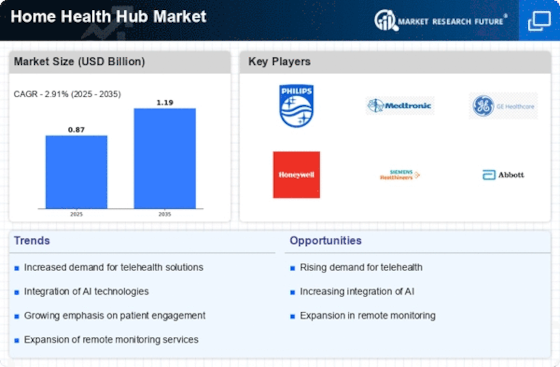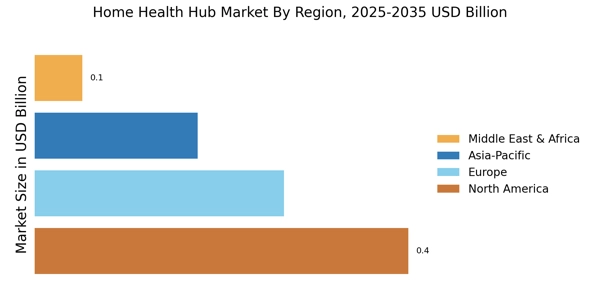Rising Healthcare Costs
The escalating costs associated with traditional healthcare services are prompting a shift towards home-based care solutions. The Home Health Hub Market is positioned to benefit from this trend, as patients and providers seek more cost-effective alternatives. Data indicates that home health care can reduce hospital readmission rates by approximately 20%, leading to significant savings for both patients and healthcare systems. This financial incentive encourages the adoption of home health hubs, which offer comprehensive care management and support services. As healthcare costs continue to rise, the Home Health Hub Market is likely to see increased investment and growth, as stakeholders recognize the potential for improved patient care at a lower cost.
Technological Advancements
The Home Health Hub Market is experiencing a surge in technological advancements that enhance patient care and streamline operations. Innovations such as telehealth platforms, remote monitoring devices, and artificial intelligence are becoming increasingly prevalent. These technologies facilitate real-time health data collection, enabling healthcare providers to make informed decisions. According to recent data, the integration of these technologies is projected to increase efficiency in home health services by up to 30%. This trend not only improves patient outcomes but also reduces operational costs, making home health services more accessible. As a result, the Home Health Hub Market is likely to expand, driven by the demand for innovative solutions that cater to the needs of patients and providers alike.
Consumer Preference for Home-Based Care
There is a noticeable shift in consumer preferences towards home-based care solutions, driven by the desire for comfort and convenience. The Home Health Hub Market is capitalizing on this trend, as more patients opt for receiving care in their own homes rather than in institutional settings. Surveys indicate that over 70% of patients prefer home health services for their flexibility and personalized approach. This consumer inclination is prompting healthcare providers to invest in home health hubs that offer a range of services, from nursing care to rehabilitation. As the demand for home-based care continues to grow, the Home Health Hub Market is expected to thrive, reflecting the changing landscape of patient care.
Regulatory Support for Home Health Services
Regulatory frameworks are increasingly supportive of home health services, which is positively impacting the Home Health Hub Market. Governments are recognizing the importance of home-based care in alleviating pressure on healthcare systems. Recent policy changes have led to increased funding and reimbursement options for home health services, making them more accessible to patients. This regulatory support is likely to encourage the development and expansion of home health hubs, as providers seek to align with new guidelines and funding opportunities. As a result, the Home Health Hub Market is poised for growth, driven by favorable regulations that promote home health services as a viable alternative to traditional care.
Increased Focus on Chronic Disease Management
Chronic diseases are becoming more prevalent, necessitating effective management strategies. The Home Health Hub Market is responding to this need by providing tailored solutions for patients with chronic conditions. With an estimated 60% of adults living with at least one chronic disease, the demand for home health services is on the rise. Home health hubs facilitate continuous monitoring and personalized care plans, which are essential for managing these conditions effectively. This focus on chronic disease management not only improves patient quality of life but also reduces the burden on healthcare facilities. Consequently, the Home Health Hub Market is likely to expand as healthcare providers increasingly recognize the importance of proactive care in managing chronic diseases.

















